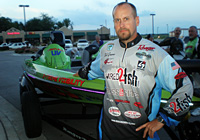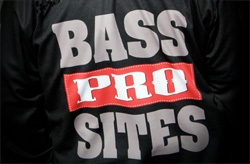Attract Bass Fishing Sponsors
 So you wanna be a sponsored professional angler huh? Take it from Bass Pro Sites Pro Staffer, Bob Greene, it pays to do your homework. Tournament Bass fishing has exploded into an industry worth billions of dollars. So how do you get your piece of the pie? Careful what you wish for. There’s more to being sponsored than donning a patch or logo and hitting the lake. In fact, what you do off the water is just important. If you're looking to take your fishing to the next level, then take note - sponsorship 101 is now in session.
So you wanna be a sponsored professional angler huh? Take it from Bass Pro Sites Pro Staffer, Bob Greene, it pays to do your homework. Tournament Bass fishing has exploded into an industry worth billions of dollars. So how do you get your piece of the pie? Careful what you wish for. There’s more to being sponsored than donning a patch or logo and hitting the lake. In fact, what you do off the water is just important. If you're looking to take your fishing to the next level, then take note - sponsorship 101 is now in session.
Once upon a time an angler was eager to sew a patch on his tournament shirt for a free pack of worms or a spool of line. Now day’s anglers sell advertising space on their sublimated jerseys, truck, and boat wraps as part of their sponsorship package and successful anglers at the highest levels of our sport command lucrative compensation for their services.
Imagine if you will a triangle. The base of the triangle is always broader than the point at the top. This triangle represents tournament anglers as a whole. The broader base represents the lower level competitors; the grass roots anglers that fish local, state and regional Pro Am style events. The further toward the top of the triangle you travel, the narrower the scope. If you fall into the baseline category or somewhere in between the base and the top it doesn’t mean you can’t be sponsored it just means you probably have to work hard for a different level of compensation.
As you may know there are varying levels of sponsorship. Sponsorship can range from field staff and regional representatives where you're discounted on product to full retainer contracts and everything in between. But how do I get there from here?
 Just like the first step in any job search you need to start with a résumé. Yes, you read correctly; job search. Remember this is the fishing industry. Industry is business and companies are in business to make money. To that end if sponsored you then become an employee or representative of that company therefore you’re searching for a job. They’re compensating you for the service that you’ll provide just like your full time employer does. Your résumé needs to highlight how you plan to serve the company. In effect you’re selling yourself just like you did when you interviewed for the full time job you probably hold now.
Just like the first step in any job search you need to start with a résumé. Yes, you read correctly; job search. Remember this is the fishing industry. Industry is business and companies are in business to make money. To that end if sponsored you then become an employee or representative of that company therefore you’re searching for a job. They’re compensating you for the service that you’ll provide just like your full time employer does. Your résumé needs to highlight how you plan to serve the company. In effect you’re selling yourself just like you did when you interviewed for the full time job you probably hold now.
As an angler you need to make an honest assessment and ask yourself a couple of questions. First you need to decide what it is that you bring to the table. What can you offer the company? Notice I didn’t say how much money or product can you get out of the deal? The worst mistake any angler can make at any level is to approach a potential sponsor with a “what can you do for me” attitude. Once you figure out what it is that you have to offer, reflect that in your résumé.
In my experience being sponsored can be as demanding as a full time job and obtaining and maintaining sponsor relationships is getting increasingly more difficult based on the market and the number of quality professionals in the hunt; so don’t expect the work to get any easier. The anglers that are successful are the ones that actually put forth the effort for their sponsors by working boat, outdoor, or sports shows, providing seminars, writing articles, and networking through social and other media in an attempt to advertise and ultimately sell the product or service.
Most sponsors can care less if you're a winner on the water. What they really care about is what you can do to help their business be more successful or help sell product. Bruce Stanton, director of public relations for PRADCO says, "A lot of people act like we owe them something just because they win a tournament. Not to sound blunt, but fishermen are a dime a dozen. Sponsorship relations are not about what a company can do for a fisherman anymore, they are about what a fisherman can do for a company." At some point, a company is going to want to see proof of your ability to communicate, promote and sell, above and beyond your fishing performance especially when you try to advance from a product type of sponsorship to a cash incentive program or retainer contract.
The second question you need to ask yourself is what companies do I want to pursue and for what level of position? As I stated before there are different levels of staff positions and different companies run their programs in a manner that’s most beneficial to them. As a member of a field staff or a regional representative for a company you may receive a discount on product, you may be paid in product or you may receive a salary. It all depends on the amount of work you're willing to do and how you negotiate your sponsorship package. You have to decide what you're worth and then you have to decide what you'll accept. You need to determine what you can handle and manage effectively. This is where you will really see that being sponsored can be a full time job itself. If you have fifteen sponsors and they all expect some amount of work juggling all those companies, a full time job, and a family you may leave very little time to get out on the water. Like most things in life; it’s a balancing act and you don't want to overextend yourself.
You can’t honestly represent any company that you aren’t familiar with. My best advice and what I tell everyone is "don't seek sponsorship from a company that you don't believe in, or from a company that you don't use their product and aren’t familiar with". I've seen that go south more often than not, and an angler is on the phone with the president or CEO of company X looking for a free ride because they have the very best bass fishing widget on the market and then it comes, the question. It can take many different forms, but essentially it boils down to “how long have you used our product, what do you like most about our product, where do you see room for improvement of our products?” To be able to speak honestly and intelligently about these products you have to have intimate knowledge or you’re doing company X and yourself a disservice.
For as vast as the professional fishing community is, it’s easy for your reputation to precede you so when you develop your relationship with a company you need to be willing to work boat, outdoor, sports and tackle shows, set up displays, introduce products to retailers, transport, wash and wax boats all in an effort to build your relationship and your reputation. A good angler can flip a Fitzwater Jig; a great angler can sell a Fitzwater Jig.
Remember, it’s not what the company can do for you; it’s what you can do for the company.







